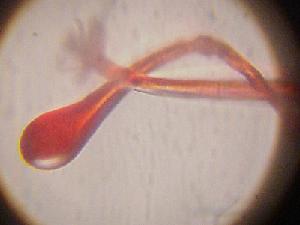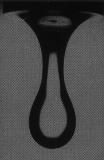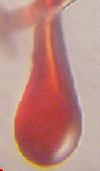

|
|
||||
Alien and UFO ResearchLiquid Droplet May Hold Clues to Formation of "Pseudo Crystals"
Researchers have discovered that pseudo crystals are trace physical evidence left behind at locations where people have reported seeing or being abducted by aliens. This is an update to the previous AAER report,
Alien and UFO Research: Physical Evidence of Alien Abductions May Exist in Household Dust. January 18, 2001 Pseudo crystals are microscopic particles found at locations where people have reported encounters with aliens. While the microscopic particles remain unidentified, the liquid droplet shape may hold clues to the formation of the pseudo crystals. More research into the pseudo crystals continues through the work of biophysicist Dr. William C. Levengood of Pinelandia Biophysics Laboratory of Michigan and AAER. While pseudo crystals come in a variety of shapes and colors, some have a head shaped like a falling liquid droplet. The shape of a liquid droplet depends on the viscosity of the liquid. The similarity between a pseudo crystal head and a liquid droplet suggests the pseudo crystal may have been formed from a liquid. Figure 4 is a photo of a red pseudo crystal taken at 400x power under the microscope. This pseudo crystal was found in the household dust of a family claiming to have seen aliens or to have been abducted. The width of the head of this pseudo crystal measures in the region of 16 microns which is too small for the human eye to see. Note how the rounded, tear-drop head looks like a liquid droplet. Compare this red tear-drop shaped head with Figures 1 and 2 on the right. Is this shape an indicator to its possible formation from a liquid? The answer is unknown, while the research continues.
Cascading liquid droplets suggest a possible origin to pseudo crystals. Figure 1 shows a drop of falling liquid. Figure 2 above shows a drop of liquid continuing to fall. Note how the droplet becomes more elongated as it falls. Figure 3 above shows a close-up of the pseudo crystal from Figure 4 on the left.
Note how similar this shape is with the liquid droplet above in Figure 2. Photo credits for Figures 1 and 2 for liquid droplets: Xiangdong D. Shi, Michael P. Brenner, and Sidney R. Nagel in their article entitled, A Cascade of Structure in a Drop Falling from a Faucet, from Science, vol. 265, July 8, 1994, pp. 219 - 222. Photo credits for Figures 3 and 4 for Alien Abduction Experience and Research. Copyright © 2001. All Rights Reserved. |
Alien Abduction Experience and Research
Copyright ©1996 - 2019. All Rights Reserved.



